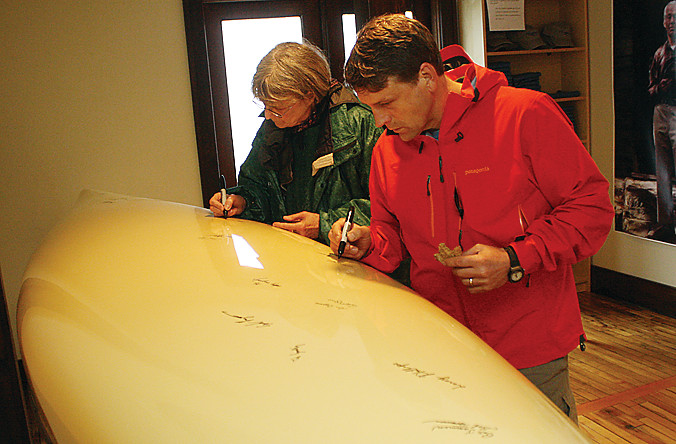Support the Timberjay by making a donation.
Sustainable Ely mining education center now open
ELY – Jan Attridge and Frank Moe drove from Grand Marais to Ely on a dreary Saturday afternoon to lend their support to Sustainable Ely, a new “education and action center” that opened June 1 …
This item is available in full to subscribers.
Attention subscribers
To continue reading, you will need to either log in to your subscriber account, or purchase a new subscription.
If you are a current print subscriber, you can set up a free website account and connect your subscription to it by clicking here.
If you are a digital subscriber with an active, online-only subscription then you already have an account here. Just reset your password if you've not yet logged in to your account on this new site.
Otherwise, click here to view your options for subscribing.
Please log in to continue |
Sustainable Ely mining education center now open
ELY – Jan Attridge and Frank Moe drove from Grand Marais to Ely on a dreary Saturday afternoon to lend their support to Sustainable Ely, a new “education and action center” that opened June 1 to provide information concerning proposed copper and nickel mining near the Boundary Waters Canoe Area Wilderness.
The Sustainable Ely office, located on top of the hill on Sheridan Stree had a grand opening that included a short canoe trip on the South Kawishiwi River and an open house at the facility with music and refreshments.
A plan by supporters to portage canoes, up the hill, from Piragas’ on one end and from Whiteside Park on the other end, to the new center was abandoned. Unofficial reasons cited included bad weather, no parade permit and concerns over protestors.
Attridge and Moe signed a shiny Wenonah canoe dotted with scores of signatures. The canoe will be portaged down the mall in Washington, D.C. and presented to President Barack Obama as a way to ask him to protect the watershed around the Boundary Waters Canoe Area Wilderness.
“I don’t think a copper mine here is a good idea,” Attridge said. “The water will be damaged. That’s my concern.”
Moe said he was concerned about future environmental issues. “The clean-up will remain forever,” he said, “and who pays for that? We as taxpayers will be left holding the bag, just like in all the other areas around the country where this mining was done.”
The center will be open 10 a.m. to 8 p.m. Monday through Saturday and 10 a.m. to 6 p.m. Sunday, staffed by volunteers, a part-time volunteer coordinator and two college interns.
Northeastern Minnesotans for Wilderness, an advocacy group, says the goal of the new center is to: “build and support a strong base of concerned citizens who will meet, inform, and inspire to action visitors to Ely and local residents; to engage in this work for the purpose of creating a national movement to protect the clean water, clean air, and forest landscape of the watersheds of the Kawishiwi River, the Boundary Waters Canoe Area Wilderness, and Lake Superior from toxic pollution caused by mining copper, nickel, and other metals from sulfide-bearing ore.”
Becky Rom, one of about a 100 contributors to the action center, welcomed the dozens of supporters on Saturday.
“We want people to come here and have a conversation and learn about the proposed sulfide mining project,” she said. “This community owns its own future, not some Chilean millionaire. The BWCA watershed is very important for our community. Sulfide mining has never been done in such a water-rich environment.”
Twin Metals officials say their proposed mining effort will provide strategic metals and lots of jobs for generations, and that they’ve been conducting environmental studies and assessments for more than five years.
The proposed PolyMet copper-nickel mine reached a major milestone in mid-May.
Their long-awaited preliminary draft supplemental Environmental Impact Statement was released to the co-lead agencies, including the Minnesota Department of Natural Resources, the U.S. Army Corps of Engineers, and the U.S. Forest Service; and cooperating agencies, including the U.S. Environmental Protection Agency and the Bois Forte, Fond du Lac, and Grand Portage bands. The public may review it later this summer.
The initial environmental impact statement for the PolyMet mine was released in 2009, but the EPA called it inadequate.
As a result, PolyMet made several changes to their proposed mine. For example, the company now plans to treat all water discharge with reverse osmosis to meet the state’s sulfate standard for wild rice.
PolyMet expects the final EIS to be completed and permits issued in the first half of 2014, which would allow for the start of construction later that year. If that happens, production would start in the latter half of 2015.
“We need to be skeptics,” Rom said. “Show us where mining has been done where there was no harm. We don’t want public relations lines and statistical modeling. They never provide any real answers.”






